Basic Russian Phrases || A Guide for Beginners
Learn The Most Useful Russian Phrases || Beginners Guide
If you’re just starting to learn Russian, congratulations! You’ve taken on a challenging but rewarding task.
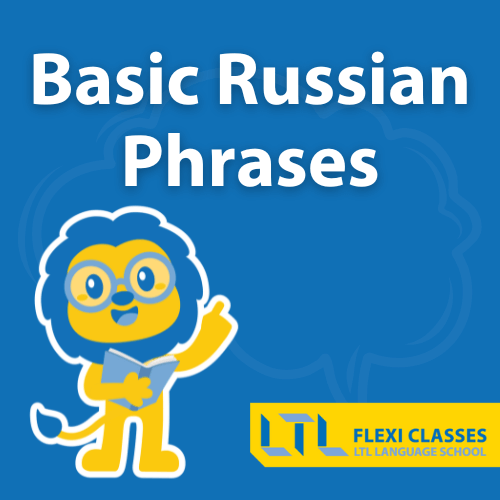
Acquainting yourself with the basics of a new language can be daunting, but luckily there are some simple and basic Russian phrases that will help you get by in any situation.
In this blog post, we’ll go over some essential phrases for beginners, including greetings, introductions, and common expressions.
By the end, you’ll be ready to start using your newly acquired language skills in the real world. So let’s get started!
Skip the the section you are trying to learn or if you are a complete beginner, bookmark this page and study through it slowly but surely 🤩
Basic Russian Phrases || Saying Hello
Basic Russian Phrases || Yes and No
Basic Russian Phrases || Please and Thank You
Basic Russian Phrases || I’m Sorry
Basic Russian Phrases || Do You Speak…
Basic Russian Phrases || My Name is…
Basic Russian Phrases || Other Useful Phrases
Basic Russian Phrases || Take the Quiz
Basic Russian Phrases || FAQs
Basic Russian Phrases || Saying Hello
Привет (pree-vyet) and Здравствуйте (zdrah-stvooy-tee)
Greetings are an important part of any language, and Russian is no different.
One of the most commonly used greetings in Russia is Привет (pree-vyet), which translates to “hello” or “hi”.
For a more formal greeting, you can use Здравствуйте (zdrah-stvooy-tee), which could be translated as “good day”, or even “good morning”.
While not always necessary, these phrases should be used in more formal settings such as when meeting someone for the first time.
Remembering and using these simple two words will ensure that you make a good impression among Russians!
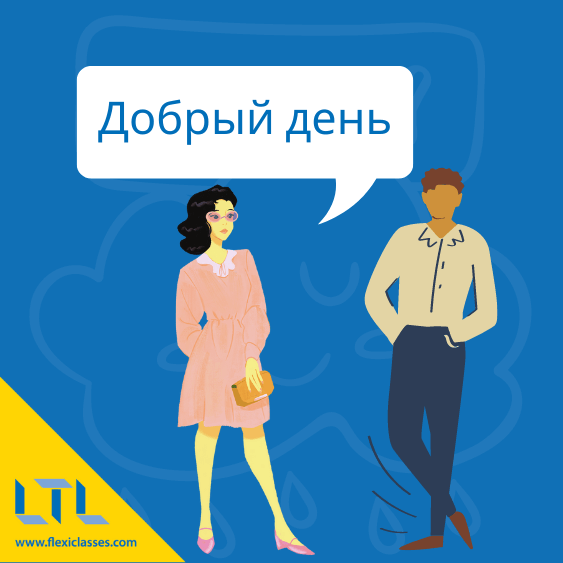
We can also use Добрый день (Dobryj den’) for good day or if we want to be more accurate regarding the time of day:
- Good Morning | Доброе утро (dobroye utro)
- Good Afternoon | Добрый день (dobryy den’)
- Good Evening | Добрый вечер (dobryy vecher)
We can also use Доброй ночи (dobroy nochi) to say good night when departing for the evening.
Vocab Summary
| English | Russian | Pronunciation |
|---|---|---|
| Greetings | Здравствуйте | zdrah-stvooy-tee |
| Hello | Привет | privet |
| Good day | Добрый день | Dobryj den’ |
| Good morning | Доброе утро | dobroye utro |
| Good afternoon | Добрый день | dobryy den’ |
| Good evening | Добрый вечер | dobryy vecher |
| Good night | Доброй ночи | dobroy nochi |
Basic Russian Phrases || Yes and No
Да (da) and Нет (nyet)
While yes and no may seem simple enough, understanding them in Russian can be a bit tricky.
TOP TIP || Whilst Да (da) means yes and Нет (nyet) means no, but they are used differently than in English.
In certain contexts, such as when the speaker is being polite, the answer might actually be Нет even if they mean “yes”.
Additionally, it’s worth noting that while English often carries a connotation of finality with the word “no”, this doesn’t always hold true for Нет.
TAKE NOTE || Stating Нет could simply mean no at that moment without eliminating all potential for a “yes” in the future.
All of these nuances should be taken into account by non-native speakers when using these essential words!
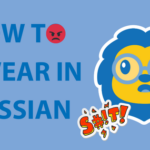
19 Swear Words in Russian || USE WITH CAUTION!
It’s time to up our game with Russian. Today we teach you lots of ways to curse in Russian. Here is our guide to 19 Russian swear words you need to learn.
Basic Russian Phrases || Please and Thank You
Пожалуйста (poh-zhah-loo-sta) and спасибо (spa-see-ba)
Two seemingly small words make a world of difference – please and thank you.
In the Russian language, these common words are expressed as “Пожалуйста (poh-zhah-loo-sta)” and “спасибо (spa-see-ba)”.
Saying them not only shows good manners but also helps to build relationships between yourself and those around you.
Other ways to say thank you in Russian include:
- Thank You (f) | спасибо Вам (spasibo vam)
- Thank You (inf) | спасибо тебе (spasibo tebe)
- Thank You (inf) | спасибочки (spasibochki)
- Thanks a lot | спасибо большое (spasibo bol’shoye)
- I’m grateful | я благодарен (ya blagodaren)
Vocab Summary
| English | Russian | Pronunciation |
|---|---|---|
| Please | Пожалуйста | poh-zhah-loo-sta |
| Thank you | Спасибо | spasiba |
| Thank you (formal) | спасибо Вам | spasiba vam |
| Thank you (informal) | спасибо тебе | spasiba tebe |
| Thanks (most informal) | спасибочки | spasibachki |
| Thanks a lot | спасибо большое | spasiba bol’shoye |
| I’m grateful | я благодарен | ya blagodaren |
BONUS || if someone has just thanked you for something, you are likely probably going to reply with “you’re welcome”.
Here’s how to address this situation…
| English | Russian | Pronunciation |
|---|---|---|
| You’re welcome (most common | пожалуйста | pozhaluysta |
| My pleasure | не за что | nya za chto |
| Happy to help | рад(а) помочь | rad(a) pomoch’ |
NOTE || пожалуйста is the most commonly used here. In fact, не за что is flt to have some snobbish connotations as it’s used for when you are being overthanked.
рад помочь is the male version so for females, рада помочь is used.

Basic Russian Phrases || I’m Sorry
Извините (izviniti)
Expressing regret in Russian is easy to do!
I’m sorry translates to Извините. The informal version is this is the slightly shorter Извини.
Whenever you need to apologize for your actions or make amends in any way, saying Извините with humility and understanding would be the right approach.
TOP TIP || It’s a kind gesture to offer an apology like Извините, even if the wrong wasn’t your own fault.
Expressing remorse in any language can easily go a long way in improving relationships and is key to maintaining one’s integrity.
FUN FACT || Извинить comes from the noun Вина (vina) which means fault.
Other ways to say sorry include Простите (prostite) and Прошу прощения (proshu proshcheniya), although the latter translates more directly to I apologize rather than I’m sorry.
Vocab Summary
| English | Russian | Pronunciation |
|---|---|---|
| I’m sorry | Извините | izviniti |
| Excuse me | Извините | izviniti |
| Sorry (formal) | Простите | prostite |
| Sorry (informal) | Извини | izvini |
| I apologize | Прошу прощения | proshu proshcheniya |
Basic Russian Phrases || Do You Speak…
Вы говорите по-английски? (vy govorite po an-gleezkee?)
английски meaning English
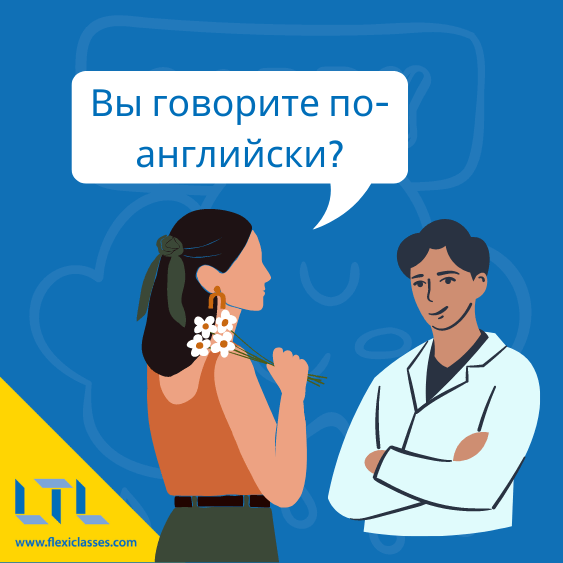
Learning to communicate in different languages is a great skill to have and can open many doors.
Many countries around the world use English as either their native language or put it to good use in international communication.
Knowing English helps you connect with people all over the world, and opens up access to interesting books, movies, music, and cultures.
Learning how to ask, “do you speak English?” (вы говорите по-английски?) is a great first step to beginning your journey in learning this interesting language!
But English isn’t everyone’s native language! So here are some more sentences that start with do you speak…
Vocab Summary
| English | Russian | Pronunciation |
|---|---|---|
| Do you speak English? | Вы говорите по-английски? | vy govorite po-an-gleezkee? |
| Do you speak Mandarin Chinese? | Вы говорите по-китайски? | vy govorite po-kitayski? |
| Do you speak Spanish? | Вы говорите по-немецки? | vy govorite po-nemetski? |
| Do you speak Japanese? | Вы говорите по-японски | vy govorite po-yaponski? |
| Do you speak French? | Вы говорите по-французски? | vy govorite po-frantsuzski? |
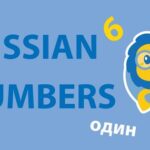
Numbers in Russian | How to Count from 1-100 (And Beyond)
One of the first things you will need to learn in any language is the numbers. Today we focus on how to say Russian numbers. Quiz and Flashcards included.
Basic Russian Phrases || My Name Is…
меня́ зову́т… (menya zohvoot…)
меня́ зову́т.. is how you say my name is in Russian.
KEY NOTE || The stress comes on the 2nd syllable of each word so the intonation for each word rises slightly.
See here…

Here are some full sentences:
- My name is Alex = Меня зовут Алекс
- My name is Max = Меня зовут Макс
- My name is Katie = Меня зовут Кэти
- My name is Phoebe = Меня зовут Фиби
The structure is simple, just add your name onto the end.
You can also use Мое имя… (moyo imya…). Oddly enough this is actually the direction translation from English but is much less common than Меня зовут.
DID YOU KNOW || Меня зовут actually directly translates to “they call me…”
To be able to tell someone your name, you’ll need to understand the question before – What is your name?
In Russian this is Как вас зовут (kak vas zovut) in more formal situations Как тебя зовут (kak tebya zovut) for informal situations.
Vocab Summary
| English | Russian | Pronunciation |
|---|---|---|
| Name | Имя | imya |
| My name is… | Меня зовут… | menya zohvoot… |
| My name is… (less common) | Мое имя… | moyo imya |
| What is your name (formal) | Как вас зовут | kak vas zovut |
| What is your name (informal) | Как тебя зовут | kak tebya zovut |
Basic Russian Phrases || Other Phrases
We’ve covered the basics, but there’s more we can provide you before we finish.
Here is a quick list or some other very useful phrases for beginners of Russian.
| English | Russian | Pronunciation |
|---|---|---|
| How are you? | Как дела? | kak dela? |
| How’s life? | Как жизнь? | kak zhivietsa |
| See you soon | До скорого | do skorogo |
| Bye | Пока | poka |
| See you next time | Обязательно приеду к вам снова | obyazatelʹno priyedu k vam snova |
| How old are you? | Сколько вам лет? | skolʹko vam let |
| I am ___ years old | Мне ___ лет | mne let |
| I don’t speak Russian | Я не говорю по-Русски | ya ne govoryu po-Russki |
| Where is the toilet? | Где туалет? | gde tualet? |
| Pleased to meet you | Приятно познакомиться | priyatno poznakomit’sya |
| How much is it? | Сколько стоит? | Skol’ko stoit? |
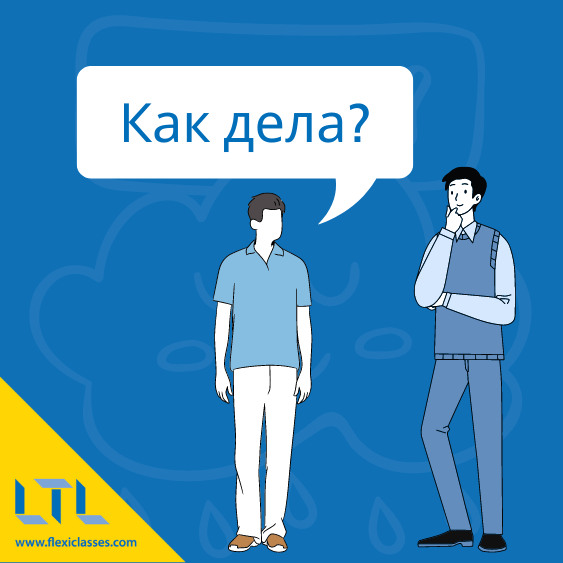
Mastering even a few greetings in Russian goes a long way and shows Russians that you’re interested in their culture and eager to integrate.
These are just a few examples of some hugely useful basic phrases in Russian.
Try them out the next time you travel to Russia or speak to a Russian friend!
With practice, you’ll be able to master more complicated phrases and sound like a true native speaker in no time.
Drop us a comment below if you have any questions. Thanks for reading.
BONUS || Test Your Knowledge
Are you ready to see if you REALLY know your basic phrases in Russian?
Now is the time to try! The quiz will take about 3 minutes and you’ll get your results immediately after completing the test.
Love learning languages? So do we!
Here are some more related articles we think you’ll also enjoy
- Discover over 100 basic Mandarin phrases
- Learn 30+ phrases for Japanese beginners (with quiz)
- Unlock these basic Vietnamese phrases for travellers
- 30 beginner phrases in Korean that you need to know
BASIC RUSSIAN PHRASES || FAQs
How do you say Hello in Russian?
Hello in Russian is Привет (pree-vyet) and Здравствуйте (zdrah-stvooy-tee).
Привет is the more informal version whilst the latter is known to be used in formal situations, like when you first meet someone.
How do you say Please in Russian?
Please in Russian is Пожалуйста.
How do you say Thank You in Russian?
Thank you in Russian is Спасибо (spasiba).
What is Меня зовут?
Меня зовут means my name is in Russian.
What does Как дела mean?
Как дела means how are you in Russian and is an informal way of asking how someone is doing.
How do you say Bye in Russian?
Bye in Russian is simply Пока which is pronounced as poka.
Want More From LTL?
FANCY LEARNING RUSSIAN? Check out our online Russian courses here.
We offer a 7-day free trial to all online students where you can study Russian 24/7.
Come and be a part of our amazing community.













2 comments
I am interested with Russia language and I want to master it . I would like to pay a visit in Russia also in order to be influenced and to reunite
That's great you are interested.
If you want to practice your Russian before coming to Russia you should check out this >>> https://flexiclasses.com/flexi-registration/